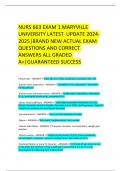NURS 663 EXAM 1 MARYVILLE
UNIVERSITY LATEST UPDATE 2024-
2025|BRAND NEW ACTUAL EXAM
QUESTIONS AND CORRECT
ANSWERS ALL GRADED
A+|GUARANTEED SUCCESS
Lithium labs - ANSWER-✅level, NA, Ca, P, EKG, Creatinine, Urinalysis, CBC, TSH
bipolar meds: depression - ANSWER-✅lurasidone (13+), olanzapine + fluoxetine
(10+)(symbyax)
bipolar acute and mixed mania - ANSWER-✅aripiprazole, risperidone, olanzapine
(13+), quetiapine (acute only), asenapine (10+)
classic mood stabilizers - ANSWER-✅Lamotrigine (excellent medication to use),
lithium, Depakote (avoid in females if possible due to PCOS and Pregnancy), Tegretol,
Trileptal (no evidence for true Bipolar disorder)
anti-depressants - ANSWER-✅class not used w/bipolar disorder
lithium - ANSWER-✅Anti-manic, antidepressant, anti-suicidal
Lithium side effects - ANSWER-✅Frequent urination, increased thirst, weight gain,
sedation
lithium toxicity - ANSWER-✅sudden onset tremors, N/V/D, muscle weakness,
slurred speech, confusion, seizures (slowing down, feel really out of it)
Persistent Motor or Vocal Tic Disorder - ANSWER-✅pt in front of you only has one
or the other but not both—they usually don't even know it is a tic, it is only
meaningful if it's affecting their quality of life
, Tourette's d/o - ANSWER-✅Multiple motor and at least one vocal tic (some tics
come and go, they don't have them all at the same time to receive the diagnosis)
HRT - ANSWER-✅habit reversal training can be used to manage tics
Tics tx - ANSWER-✅Alpha agonists (clonidine, guanfacine); Haldol is not the first-line
txt
Developmental Coordination Disorder - ANSWER-✅a motor disorder characterized
by marked impairment in the development of motor coordination; movement isn't
consistent w/age
Stereotypic Movement Disorder - ANSWER-✅a motor disorder characterized by
repetitive, seemingly driven, and apparently purposeless motor behavior, such as
hand waving or head banging, but not include ASD sx
Specific Learning Disorders - ANSWER-✅difficulties in the acquisition and use of
listening, speaking, reading, writing, reasoning, or mathematical abilities; dx by other
professionals w/specialized training; NP tx comorbid d/o
Anorexia nervosa - ANSWER-✅an eating disorder in which an irrational fear of
weight gain leads people to starve themselves; restrictive or binge/purge/exercise
Bulimia nervosa - ANSWER-✅an eating disorder characterized by episodes of
overeating, usually of high-calorie foods, followed by vomiting, laxative use, fasting,
or excessive exercise
Binge-eating disorder - ANSWER-✅significant binge-eating episodes, followed by
distress, disgust, or guilt, but without the compensatory purging, fasting, or
excessive exercise
Avoidant/restrictive eating disorder - ANSWER-✅avoiding or restricting foods in
childhood. significantly low BMI; no distortion of body image or fear of gaining wt.
r/o delusions around food
Pica - ANSWER-✅an abnormal craving or appetite for nonfood substances, such as
dirt, paint, or clay that lasts for at least 1 month; decrs incidence with incr age
Feeding and Eating Disorders tx - ANSWER-✅Talk therapy (counseling is needed for
the distress) (intensive outpatient, partial inpatient or actual inpatient admission
may be needed); most have associated depression and/or anxiety
Feeding and Eating Disorders meds - ANSWER-✅fluoxetine help but not direct tx
Vyvanse approved for binge eating but not because of stimulant effects
Encopresis - ANSWER-✅a childhood disorder characterized by repeated defecating
in inappropriate places, such as one's clothing
, Enuresis - ANSWER-✅involuntary urination
Encopresis Treatment - ANSWER-✅Behavior management: toilet refusal behavior,
scheduled toileting time, incentives.
Prevention of constipation
Counseling
Enuresis treatment - ANSWER-✅1. First line is behavioral interventions: bed alarms,
toileting at bedtime and during the night, bladder training
2. reassurance, resolves spontan, normal 4-5 yo
Enuresis meds - ANSWER-✅Desmopressin nasal spray;
Major Depressive Disorder Dx - ANSWER-✅5+ for at least a 2-week period; either #1
or 2 req
1. Depressed mood most of the day, nearly every day (can be irritability in children &
adolescents)
2. Diminished interest or pleasure in all, or almost all, activities
3. Change appetite/weight; kids not wt goals
Insomnia or hypersomnia nearly every day
4. Up or down Psychomotor
5. Fatigue or loss of energy
6. Worthlessness/excessive or inappropriate guilt
7. Diminished ability to think or concentrate, or indecisiveness (don't confuse with
ADHD, address mood first)
8. Recurrent thoughts of death, thoughts of suicide, or suicidal plan/intent: if hosp
then 2 wk not req.
SLAP - ANSWER-✅Social supports; lethal; access to means; plan and previous
attempt
Suicide risk: IS PATH WARM - ANSWER-✅Ideation, substance abuse, purpose to live
gone; anxiety, trapped feeling; hopelessness, w/d from soc supports, anger w/rage;
reckless, dramatic moods
SIGECAPS - ANSWER-✅Sleep, Interest, Guilt, Energy, Concentration, Appetite,
Psychomotor, Suicide
bipolar vs unipolar: look at bipolar if - ANSWER-✅1. family hx: 1st degree relatives
2. Substance use: chasing high or low
3. Response to SSRI: no resp to multiple tries or evidence of mania with use (not
diagnostic)
coprolalia - ANSWER-✅involuntary utterance of obscenities or inappropriate
remarks




